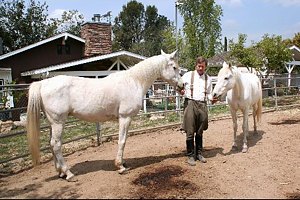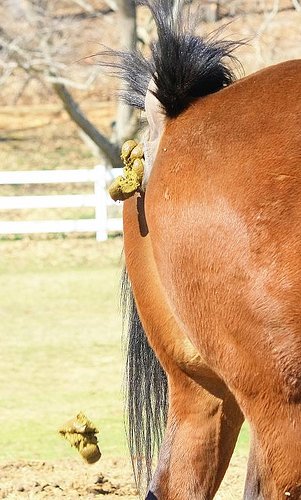|
|
|
|
|
|
|
|
|
|
Poop Predicament Has Los Angeles Horse Owners
Raising a Stink April 25, 2008 (Bloomberg) -- The poop hit the fan when the last manure mulcher in Los Angeles closed shop.
The price of poop disposal is breaking the budgets of Los Angeles horse owners, as stable owners pass along the expense of taking horse droppings to landfills. "The cost to get rid of this stuff has just skyrocketed,'' said Royan Herman, 65, who runs the Peacock Hill and J-Bar Ranch stables in the San Fernando Valley with her husband, Mark. "A lot of young families aren't able to afford a horse anymore.'' Los Angeles, the city of Hollywood stars, is also home to about 10,000 horses, said City Councilwoman Wendy Greuel. Some estimates of the horse population run as high as 20,000 within city limits and 45,000 in all of Los Angeles County, which has 9.9 million residents. The waste produced by horses living in a big city wasn't a problem for decades, as plant nurseries and compost yards accepted manure and turned it into fertilizer. When zoning officials allowed developers to build homes close to those sites, new residents complained of the stench and nurseries began turning away the dung. The owner of the last compost yard, Dickran Sarkisian, said he closed in October because he wasn't able to renew the lease. Depositing manure at a landfill costs as much as $47 a ton, five times what the mulchers charged, said Mark Herman of Peacock Hill and J-Bar. Stable owners can't afford to stay in business unless they pass that expense to boarders, he said. "In the last four to five years, the cost for individual horse owners has doubled,'' said Herman, 85. He said the 120 horses at his stables produce as much as 5 tons (4.5 metric tons) of manure a day. Equine Surrender Some Angelenos said the rising stable fees are forcing them to give up their beloved horses.
Jack Quigley, a retired oil field production technician, already had to sell his mare, Fancy. "I loved her to death,'' said Quigley, 67. "But I couldn't afford to keep her.'' Barbara Underwood, 65, who owns Ravensview, a 27-horse stable near Burbank, said she lost eight boarders when she raised prices. She charges $300 a month for a small corral and $400 for a box stall, following the $15 increase in December. She expects to boost rates again soon, by $20. At Peacock Hill and J-Bar, Royan Herman said she may have to raise fees by $100 from the current $300 to $450 a month. Riding Territory Los Angeles offers plenty of space and varied terrain for riding. The county encompasses 4,000 square miles (10,000 square kilometers), including a 70-mile (110-kilometer) Pacific Ocean coastline, mountains, forest and desert. Some horse-friendly enclaves cater to riders. In Lake View Terrace, a dry cleaner has a hitching post, and street-crossing buttons at some intersections are at a height where they can be reached from horseback. "It's this incredible feeling of being in a different world,'' said Fritz Bronner, 49, riding Faz, one of his five Arabian geldings, on one of Lake View Terrace's bridal paths. "All along my street, there are horses and chickens and dogs. It's a little country feel on a half acre.'' Much of the Los Angeles horse population is off the books. Only about 1,500 are registered, which is required by law, according to city officials.
That doesn't help the equine community's cause, said Greuel, the councilwoman. She's pushing for a Horse Advisory Task Force to get more owners to comply, so they'll have a bigger voice in municipal affairs. Some residents including formed "poop councils'' and staged registration drives to educate owners and encourage them to sign up their animals for $14 a year. "I've never even heard of registering your horse,'' said Sari Sarlund, 41, who boards her Frido at the Los Angeles Equestrian Center. Horses generate an estimated $900 million in ancillary revenues a year, Bronner said, sustaining riding teachers, veterinarians, blacksmiths, and feed and tack stores. Bronner, an actor, runs a non-profit service that provides Arabian horses for military re-enactments, parades, films and television. "It's an underground economy,'' said Bronner, who serves on the Foothill Trails Neighborhood Council. "We never get credit for it. It's never properly accounted for.'' Poop could add even more cash to city coffers. Councilman Richard Alarcon started a pilot program to recycle some of the manure into compost. "We are looking at every option available to us, including the generation of electricity,'' Greuel said. Bronner said he's worried that the poop-disposal crisis and lack of political clout may spell an end to the intangible benefits of sharing Los Angeles with horses. "The clip-clop on the streets is soothing,'' Bronner said. "Horses just slow everything down a bit. Traffic slows down, you slow down.'' To contact the reporter on this story: Nadja Brandt in Los Angeles at nbrandt@bloomberg.net |
Copyright 1987-2020 CORBA. All Rights Reserved.
Privacy Policy



 Registration Drives
Registration Drives
